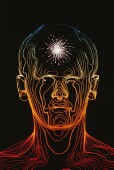
THURSDAY, Nov. 12 (HealthDay News) — The brain chemical dopamine influences how people make simple and complex decisions, from what to make for dinner to whether to have children, according to a new English study.
“Humans make much more complex decisions than other animals — such as which job to take, where to vacation, whether to start a family — and we wanted to understand the role of dopamine in making these types of decisions,” Tali Sharot, of University College London, said in a news release from the publisher of Current Biology, which is releasing the findings online Nov. 12.
“Our results indicate that when we consider alternative options when making real-life decisions, dopamine has a role in signaling the expected pleasure from those possible future events,” Sharot said. “We then use that signal to make our choices.”
Sharot and her colleagues found that giving people a drug (levodopa) that increases dopamine concentrations boosted their enjoyment as they imagined taking a vacation in a number of different destinations.
“We had reason to believe that dopamine will enhance expectations of pleasure in humans,” Sharot said. “However, we were surprised at the strength of this effect. The enhancement lasted at least 24 hours and was evident in almost 80 percent of the subjects.”
It’s possible the effect could last for weeks or even months, she said.
The study improves understanding of how people form expectations and how they make decisions.
“Understanding how hedonic expectations are formed is critical both for understanding human action, which is largely driven by estimations of future pleasure and pain, and for understanding how pleasure expectation can go awry in a multitude of neuropsychiatric disorders that implicate dopamine, such as drug addiction,” the researchers wrote. “The current study highlights the neurobiological basis of this key aspect of human behavior, providing direct evidence of a critical role for dopamine in modulating the subjective pleasure expected to be derived from future life events.”
More information
The Alzheimer’s Association has more on how the brain works.

